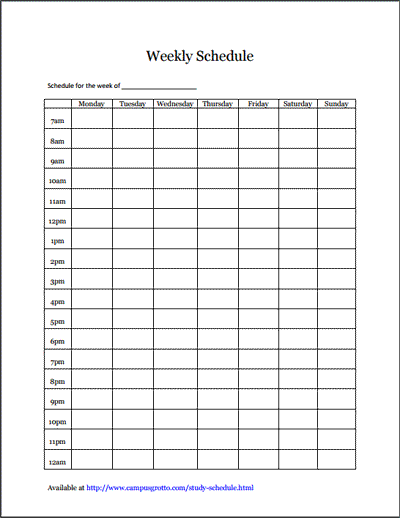
College is all about mastering the art of multitasking. The best way to tackle this is to draw up a weekly plan of attack. To do this you need to create some sort of schedule to follow and have a study plan.
Setting up a Weekly Study Schedule
The key is to get it down in writing so you get yourself on a game plan for the week ahead.
Do this by dividing an entire week into hour-long segments and then filling in each hour with a specific activity. Breaking up parts of the day into a schedule and assigning certain work to certain times reduces the chance of procrastination and keeps you on auto-pilot for the week.
You can create a study plan using the study schedule template we created for you.

Creating your Weekly Schedule
- The first step is to block off the times you will be in class. Go through each day and mark in all your classes in their respective time slots.
- The next step is to add in all other academic and social commitments for the week. This includes labs, office hours, discussions, study groups, and so on.
- Mark in the times that you will be eating meals, working, exercising, in meetings or appointments, and any social functions you have planned.
- Now that you have a better idea of the open times in your schedule, you can start scheduling in your study time. Decide how much study time you will set aside for each class. (A good rule of thumb is to allow for 2-3 hours for every hour spent in class.) Designate specific hours in the week for study time, reading, writing, and review. On your weekly schedule, mark what tasks you will complete during these study time slots and the order in which you will complete them.
Utilize hour breaks in between classes: Squeeze in study hours in short periods of free time found throughout the day, as opposed to waiting to do everything at the end of the night. Evenings are often an ineffective time to study.
When creating your study plan, think about the times when you are most productive. If you find it easier to study in the morning or have a hard time concentrating at night, schedule as much of your study time for the mornings as possible.
Studying is more effective when done in shorter regular sessions rather than long sessions, so don't schedule too long of a study period for a single subject. Give yourself short breaks.
- Leave some time blocks open for personal use or free time. This is where you can spend time socializing or connecting with family and friends.
Bonus Tip: Schedule time for review after your classes. Go over your class notes. Research has shown that reviewing new material within 24 hours of hearing it increases your retention of that material by about 60%. Schedule this review time immediately after your classes whenever possible. Use this time to edit and summarize your notes.
Effective Study Techniques
- Tackle harder work first. When you are fresh you will do better work. The problem with to-do lists is that the easiest tasks on the list usually get done first. Instead, do the more important tasks at the beginning when you are full of energy to work through and complete the task.
- If you're serious about getting work done, turn off gadgets and other technology: cell phones, email, texting, Facebook, Twitter, etc. Use a blocker if you have to.
- When writing a paper, use a word program that blocks all surrounding distractions on your computer. It removes all the screen clutter so you can clearly focus on your work.
- Consider using the Pomodoro Technique for getting things done more efficiently. This is where you set a timer and work on one specific task for 25 minutes straight, then take a short break.
Scheduling Large Projects
The key with big projects is to get started on them earlier than you think you need to.
Get started on long-term projects by breaking it into a set of small manageable steps. This way it won't hang over your head as one large looming project. This is a method some call the ESS method. Breaking down a large project into smaller tasks makes the assignment seem more feasible and you won't put off beginning the project as easily.
Tips for Creating a Weekly Schedule
- Pick a day of the week to set your weekly schedule. The most logical day to do this would be on a Sunday. Setting it on Sunday gets you mentally prepared for the week ahead. Get in a habit of creating some type of schedule every week.
- For best results, use both a semester and a weekly calendar. Review your syllabus and note important dates and assignments. Easily print out both monthly and weekly calendars here.
- Of course, creating a weekly schedule may not be necessary if you are already using a digital planner (like Google Calendar, for example), but some find better success in planning by physically writing down on paper what they need to get done for the week ahead.
- Use a study schedule in conjunction with a Moleskine planner for optimal organization.
"The key is not to prioritize what's on your schedule, but to schedule your priorities." - Stephen Covey
About the Author:
